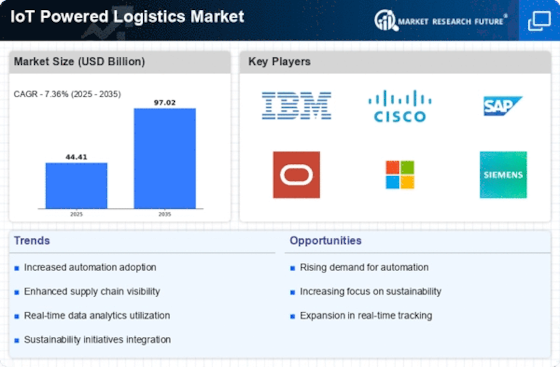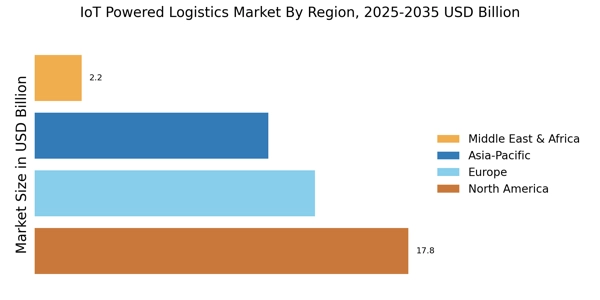Enhanced Data Analytics Capabilities
The IoT Powered Logistics Market is significantly influenced by advancements in data analytics. The proliferation of IoT devices generates vast amounts of data, which can be analyzed to derive actionable insights. Companies are leveraging these insights to optimize routes, reduce fuel consumption, and enhance customer satisfaction. Recent statistics indicate that logistics firms utilizing advanced analytics can achieve up to a 15% reduction in operational costs. The ability to analyze data in real-time allows for proactive decision-making, enabling logistics providers to respond swiftly to market changes. This trend underscores the importance of data-driven strategies in the IoT Powered Logistics Market, as organizations seek to harness the power of data to gain a competitive edge.
Integration of Advanced Technologies
The integration of advanced technologies such as artificial intelligence and machine learning is a significant driver in the IoT Powered Logistics Market. These technologies enhance the capabilities of IoT devices, enabling predictive analytics and smarter decision-making. For instance, AI algorithms can analyze historical data to forecast demand, allowing logistics providers to optimize inventory levels. This integration is expected to contribute to a projected growth rate of 15% in the IoT Powered Logistics Market over the next five years. As companies seek to leverage technology for competitive advantage, the adoption of advanced technologies in conjunction with IoT solutions is likely to reshape the logistics landscape.
Increased Efficiency through Automation
The IoT Powered Logistics Market is witnessing a surge in automation technologies that enhance operational efficiency. Automation, driven by IoT devices, allows for real-time tracking and management of logistics operations. This results in reduced human error and improved accuracy in inventory management. According to recent data, companies that have integrated IoT solutions into their logistics processes report a 20% increase in efficiency. The ability to automate routine tasks enables logistics providers to focus on strategic initiatives, thereby optimizing resource allocation. Furthermore, the integration of automated systems can lead to significant cost savings, as operational expenses decrease with improved efficiency. As the demand for faster delivery times continues to rise, the role of automation in the IoT Powered Logistics Market becomes increasingly critical.
Sustainability and Environmental Compliance
Sustainability initiatives are increasingly shaping the IoT Powered Logistics Market. Companies are under pressure to reduce their carbon footprint and comply with environmental regulations. IoT technologies enable logistics providers to monitor and optimize fuel consumption, thereby minimizing environmental impact. Recent studies suggest that logistics firms adopting IoT solutions can achieve a 25% reduction in emissions. This focus on sustainability not only meets regulatory requirements but also appeals to environmentally conscious consumers. As the logistics sector evolves, the integration of IoT technologies to support sustainable practices is becoming a fundamental aspect of business strategy in the IoT Powered Logistics Market.
Growing Demand for Real-Time Tracking Solutions
The demand for real-time tracking solutions is a pivotal driver in the IoT Powered Logistics Market. Customers increasingly expect transparency regarding the status of their shipments, prompting logistics providers to adopt IoT technologies that facilitate real-time tracking. This capability not only enhances customer satisfaction but also improves operational efficiency. According to industry reports, the implementation of real-time tracking can lead to a 30% reduction in delivery delays. As businesses strive to meet customer expectations, the integration of IoT solutions for tracking and monitoring shipments becomes essential. This trend reflects a broader shift towards customer-centric logistics, where the ability to provide real-time information is a key differentiator in the IoT Powered Logistics Market.

















